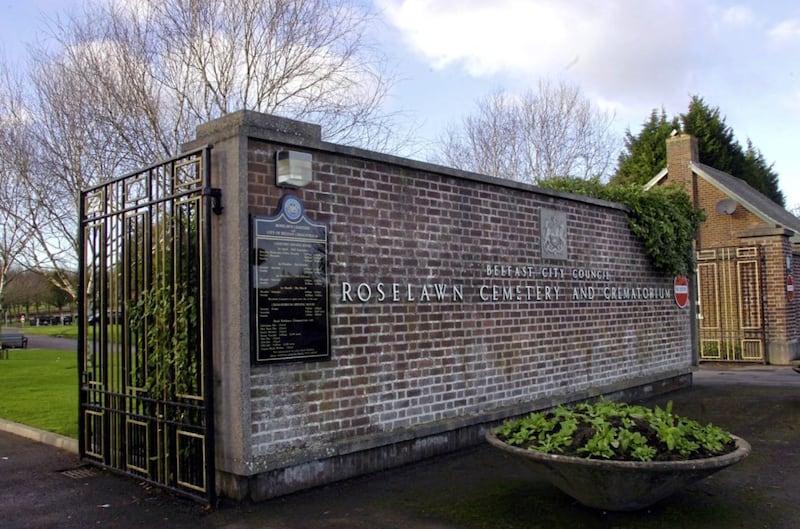NORTHERN Ireland's biggest council has warned of a backlog of bin waste in the event of a no-deal Brexit.
Belfast City Council is also preparing for a run on the banks if the UK crashes out of the European Union.
And in case of an electricity power cut, extra fuel stocks for a generator have been arranged to run its crematorium.
The concerns and contingency plans are contained in a confidential report, details of which have been leaked to The Irish News.
The 'Brexit resilience templates' also warn:
- A no-deal Brexit may lead to a "rising tide scenario" of disruption and civil unrest.
- Possible cyber attacks as part of protest activities could bring down the council's online networks, resulting in problems in paying staff and suppliers.
- The welfare of animals at Belfast Zoo may be impacted due to food shortages.
- Exporting businesses face a loss of trade as officials struggle to meet demand for certification at the ports, while food imports may have increased checks.
The report gives the council's summary of the potential impact of a no-deal Brexit in the weeks around the UK's departure date from the EU.
It was initially compiled ahead of the original Brexit deadline in March, but is being reviewed and updated ahead of the new October 31 departure date.
Read More
- Irish warehouses stockpiling ahead of Brexit
- No deal Brexit could see PSNI call in support from Britain, says chief constable
- No deal Brexit poses huge problem for farming
Council departments were asked to consider how a no-deal Brexit could affect their operations. Recommendations were then made to mitigate potential problems and the plans were examined by the council's audit section.
In the finance and resources department, officials warned a no-deal scenario could cause banking sector instability and lead to issues in making payments to parts of Europe.
Staff recommended transferring council cash from banks to other locations such as treasury bills.
In digital services, officials warned of a cyber-attack as part of protest activities.
It could disable the council's website and intranet services, preventing staff who work remotely from accessing systems, they said.
Although considered a low possibility, officials warned the impact could be significant depending on the extent of the cyber attack.
Millions of tonnes of commercial and domestic waste are exported to the EU annually from Northern Ireland and Britain for recycling or to be used as refuse-derived fuel (RDF).
Council officials said a no-deal Brexit could impact these exports, with increased checks and delays at the ports leading to a waste management backlog building up.
Analysis: Council warnings show far-reaching no-deal Brexit consequences
Extra storage sites for waste in case of delays in shipping to EU ports have been discussed.
It is understood the 'resilience templates' were discussed by councillors during Thursday's Brexit committee.

The council plans to step up preparations by holding extra meetings in the weeks running up to the UK's exit from the European Union.
In a public report presented to councillors on 'day one preparedness', officials said a workshop will be held next month to refresh the plans "based on the most up-to-date information we have".
The council detailed some measures being carried out to prepare for no deal, including plans to establish an internal information hub.
This will include dealing with "rising tide issues which could lead to an emergency activation being required".
Its port health unit has been working closely with other public bodies to roll out a new UK-wide IT system for pre-notification on imports of high-risk foods to replace existing EU systems.
Officials have also gathered data to "estimate and prepare for additional checks that may be required".
For exports, the council has been assisting Stormont's agriculture department in contacting businesses to establish their certification requirements and support them in preparing for a no-deal Brexit.
----------------
Belfast City Council's no-deal Brexit contingency plans – key points
Finances
A no-deal Brexit could cause banking sector instability, as well as affect making payments to Europe. Officials proposed transferring cash from banks to government securities such as treasury bills, with a 'custodian bank' already identified.
Cyber-attacks
A cyber attack related to protests over Brexit is considered a low possibility, but it could cause serious problems. These include potentially being unable to make payments to staff and suppliers, the council website being disabled, or staff being unable to access to intranet facilities.
Waste
Councils export to the EU significant amounts of recyclables, as well as household and business waste in the form of refuse-derived fuel (RDF). A no-deal Brexit could impact the export of RDF and recyclables to the EU, Belfast council officials warned. Increased checks and delays at the ports could lead to a backlog building up on dealing with waste. Costs are expected to rise by five to 10 per cent, in addition to potential tariffs costing an extra £33,000. Contingency options are being explored by Stormont officials. Council officials have considered extra storage sites for waste in case of delays in shipping to EU ports. Concerns were also raised of a manpower gap if EU nationals leave due to Brexit.
Civil unrest
A no-deal Brexit may cause a "rising tide scenario" of disruption in the city, requiring a multi-agency response. The council's 'emergency plan' could be activated. The risk of civil unrest could prevent staff reaching workplaces and lead to damage to buildings. There may be a need to contact funeral directors about potential disruption, such as the streets being blocked. Security costs could increase.
Belfast Zoo
Concerns were raised that the welfare of animals could be impacted if the zoo is unable to source proper food supplies for their required diets. Stockpiling food at a cost of £20,000 was recommended, but workers warned this would not be possible for fresh items like fruit and vegetables. Food supplier costs, tourist numbers, and the ease of moving animals to other zoos in future could also be affected.
Crematorium
In case of an electricity failure, the council has a generator using gas which can supply most of the power for the crematorium at Roselawn. Arrangements have been discussed for a supplier in Britain to store extra fuel for the crematorium.
Food safety and port health
Significant implications for food safety and port health services are considered a reasonable 'worst-case' scenario. Council officials have been working with other public authorities to prepare for this. There is a potential for increased checks on food imports. On exports, council officials said Stormont's agriculture department did not believe it would be able to meet demand for necessary certification processes. It was suggested this could lead to work being done on a priority basis, meaning some businesses lose trade.
Vehicles
The cost of parts used in the council's fleet of vehicles could increase by 10 to 20 per cent.








